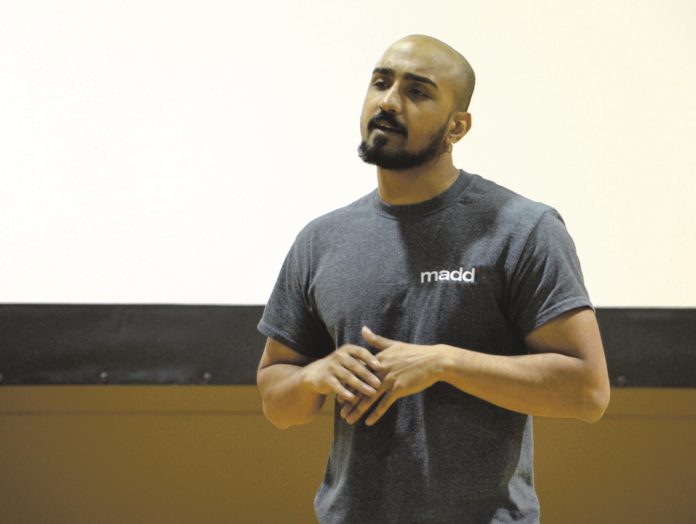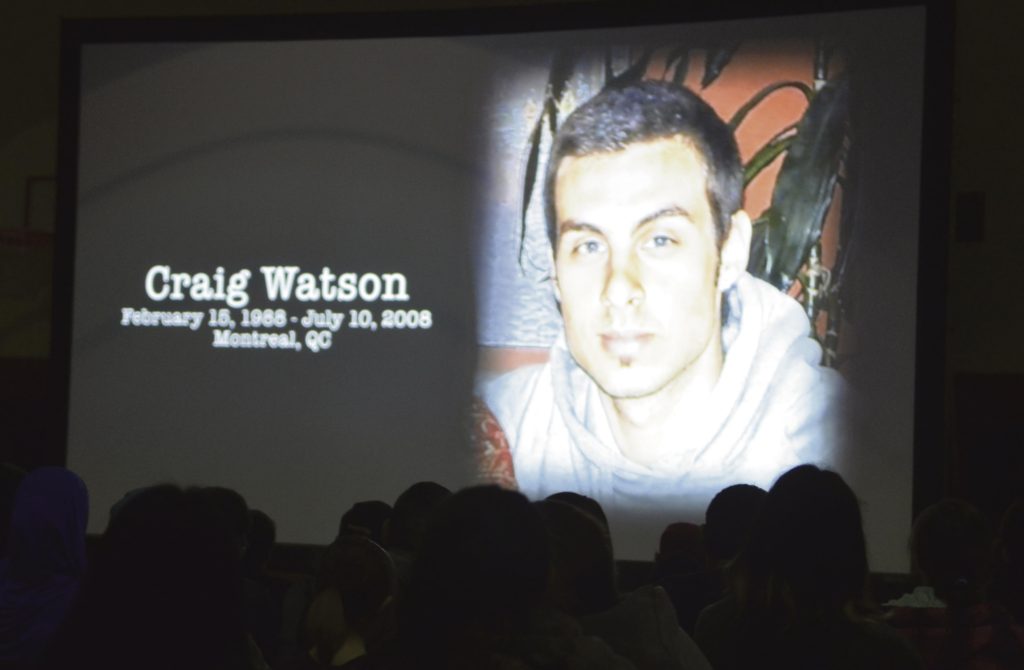
Students reminded of dangers of impaired driving
Robin Keays knows what it’s like to be in a devastating car crash caused by an impaired driver.
The vice president of MADD Prince Albert is a survivor of such a crash herself. That’s one reason she was so impressed with the video shown to students at Prince Albert Collegiate Institute (PACI) Thursday morning.
The video tells the stories of several real life victims of impaired driving, both crash survivors and family members of those who didn’t make it. It accompanies those stories and dramatic re-enactments with photos from the aftermath of the crashes themselves. The idea is to make students think twice before getting behind the wheel of a vehicle after drinking or consuming drugs.
This is Keays’ second time seeing the video. She watched it for the first time at the MADD national convention in Toronto last September.
“It hits home. It hits home so hard,” she said.
“Watching the video and then seeing … all of the pictures of the accidents of the survivors, the families, the loved ones, truly breaks my heart because I was in one of those crashes. I am a survivor.”
Keays was happy to see the video was geared towards everyone, not just survivors themselves, or kids at a party. It dealt with all sorts of situations where people have driven impaired, and focused on everyone left behind.
“I’m happy they made the video this way this year,” she said.
“It makes (people) think twice about what they’re going to do, … finding a safe way home.”
The video also struck a chord with Tiara Morris. The Grade 12 PACI student has been a part of Students Against Drunk Driving (SADD) for three years and has taken on a leadership role within the PACI group.
”The video today was very heartfelt. I experienced that kind of trauma when I was younger and living in New Mexico, so I know how that feels, even though I wasn’t involved in the accident,” she said.
“It really touched on a lot of the way people would feel. I really appreciate that (MADD) goes around to schools to spread that awareness, because there are a lot of teenagers coming into that state of doing that, so they’ll be responsible.”
Looking around at her peers, Morris said they seemed to be reacting the way the video intended.
“Just by looking at them and their expression, I could tell that it touched their hearts and really made them think to be responsible,” she said.
After the video, Brandon Radhay from MADD Canada spoke about the four rules to prevent injury or death from impaired driving. The rules are: never drive impaired, never get into a vehicle where you know or think a driver is impaired, if you’re going out with friends and family, know exactly how you’re getting home and call 911 if you know or think someone is driving impaired.

According to PACI teacher Tara Switenky, the issue of impaired driving is an important one at the school. A survey conducted by the SADD group found that over 85 per cent had an incident of impaired driving resulting in injury, bodily harm or loss of a job happen to someone with an immediate family member or friend. The survey also found that barriers exist, such as public transit not operating late at night, the high cost of taxis or families that don’t have a driver. The issues are compounded if the party occurs out of town on in a rural area.
“It’s a real issue, it’s one of concern and it’s relevant to our kids,” she said.
“(There are) lots of opportunities where people are finding themselves in situations that an get scary in a second. These presentations allow kids to put some thought into preparing for those incidents and maybe role modeling some really positive behaviours when they find themselves in situations where people are making bad decisions.”
The timing of the presentation is also key. It comes months before the legalization of marijuana and just ahead of both the onset of summer and of high school graduations.
“The timing is perfect. With grad approaching very quickly, May Long Weekend approaching very quickly — when I was in high school, every year on May Long Weekend we lost one kid from every school,” Keays said.
“I’m hoping this hits home with the kids and they realize it’s not right to drive impaired.”
Keays would like to see similar programs for younger students, those in late elementary school. She hopes that as more young people become aware of the dangers of impaired driving, these types of presentations will no longer be necessary.
Radhay agreed that it’s a good time for this presentation, though he cautioned it’s not just high school parties where impaired driving is a problem.
“This is something that can happen even if it’s just a family get together, even if you’re going out for dinner, so we want people to be aware of all of those situations in particular,” he said.
Radhay also emphasized that it’s not just about alcohol anymore.
“This can involve prescription medication in some instances, or a number of illegal drugs as well,” he said.
That message is also getting out more and more — driving high is driving impaired. One of the segments of the video focused on an impaired driver using marijuana recreationally. He ran through a stop sign, causing a fatal collision.
“Marijuana still gives you that buzz. It’s really important not to drive while under that state of being high on marijuana,” Morris said.
“I do know it makes you slower in thought, so when you’re driving you could burn out and not be aware.”
For the staff at PACI, the hope is the students think before getting into a car when they or someone else at the wheel has been drinking or using drugs.
“They have options and opportunities,” Switenky said.
“The decisions they made today do have long term impacts. They have power over themselves, and influences over their friends to continue making good decisions.”

